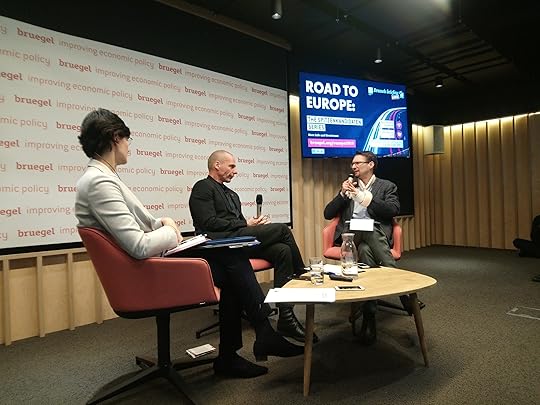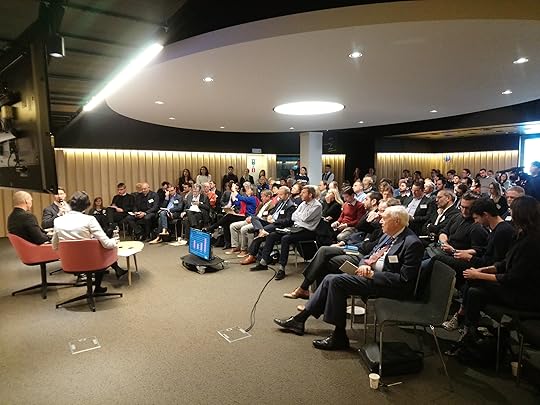Yanis Varoufakis's Blog, page 84
April 16, 2019
Το 2015 σε τρία λεπτά
Την 25η Ιανουαρίου ο ελληνικός λαός είπε όχι πια σε πέντε χρόνια υποκρισίας – σε πέντε χρόνια προσποίησης ότι η πτώχευση του ελληνικού δημοσίου μπορούσε να ξεπεραστεί με νέα μη βιώσιμα δάνεια που καλούνταν να αποπληρώνουν με το αίμα τους οι ασθενέστεροι Έλληνες, τα παιδιά τους και τα εγγόνια τους.
Πέντε μήνες διαπραγματευτήκαμε για το δικαίωμα να ακουστεί αυτό το λογικό επιχείρημα – όχι νέα δάνεια πριν αναδιαρθρωθούν τα παλαιά – όχι νέες περικοπές των ισχνότερων εισοδημάτων – ναι στις πραγματικές μεταρρυθμίσεις που πλήττουν τους πακτωλούς των εσόδων της διαφθοράς.
Ο τερματισμός της ανερμάτιστης λιτότητας και η αναδιάρθρωση του μη βιώσιμου χρέους ήταν οι δυο διαπραγματευτικοί μας στόχοι.
Δυστυχώς οι δανειστές αρνήθηκαν κάθε ουσιαστική συζήτηση. Από την πρώτη στιγμή σχεδίασαν να μας κλείσουν τις τράπεζες ώστε να μας ταπεινώσουν στα δύο αυτά μέτωπα: της Λιτότητας και του μη βιώσιμου χρέους.
Να μας επιβάλουν δήλωση μετανοίας για την κριτική που ασκήσαμε στα αποτυχημένα Μνημονιακά Προγράμματα αρθρώνοντας για πρώτη φορά στο Eurogroup επιστημονικό λόγο στον οποίο δεν είχαν αντίλογο.
Αυτός ήταν ο στόχος του τελεσιγράφου της 25ης Ιουνίου το οποίο σήμερα ο λαός τους επέστρεψε.
Από αύριο, με το γενναίο αυτό ΟΧΙ που μας προίκισε ο ελληνικός λαός, με το ΟΧΙ που είπε αγνοώντας τον φόβο που δημιούργησαν με τις κλειστές τράπεζες και τα ΜΜΕ της ολιγαρχίας.
Με αυτό το εργαλείο θα τείνουμε χείρα συνεργασίας προς τους εταίρους μας. Θα τους καλέσουμε έναν-έναν να βρούμε κοινό τόπο.
Θα δούμε θετικά το ότι το ΔΝΤ πριν δυο μέρες εξέδωσε, προς τιμήν του, έκθεση που επιβεβαιώνει ότι το χρέος μας χρειάζεται αναδιάρθρωση.
Θα αντιμετωπίσουμε θετικά την ΕΚΤ που κράτησε την περασμένη εβδομάδα στάση αναμονής – μια στάση που δείχνει την κοινή μας αγωνία για την ανάγκη εξεύρεσης αμοιβαίως επωφελούς συμφωνίας – λύσης.
Θα αντιμετωπίσουμε θετικά την Ευρωπαϊκή Επιτροπή που, όπως κι εμείς, θέλει να παίξει θετικό ρόλο στην επούλωση της ελληνικής πληγής που πληγώνει και την Ευρώπη.
Από αύριο η Ευρώπη, της οποίας η καρδιά χτυπά στην Ελλάδα απόψε, αρχίζει να γιατρεύει τις πληγές της, τις πληγές μας.
Πέντε ώρες αργότερα. 03.50πμ 6ης Ιουλίου. Στο σπίτι του πια ο Γιάνης Βαρουφάκης, λέει τα εξής στην σύντροφό του Δανάη Στράτου:
April 15, 2019
April 12, 2019
April 7, 2019
Ναι, ίδιοι δεν είναι. Γίνονται όμως – EφΣυν 6 ΑΠΡ 2019
Ναι, πράγματι, δεν είναι ίδιοι. Οποιος λέει ότι Τσίπρας και Μητσοτάκης, Νέα Δημοκρατία και ΣΥΡΙΖΑ, είναι ένα και το αυτό κινείται από ελατήρια εμπάθειας.
Από τη μία, έχουμε ένα κόμμα εκούσια, για να μην πω με ενθουσιασμό, σφιχταγκαλιασμένο με την ξενοφοβία, τον εθνικισμό και όλες τις οβιδιακές μεταμορφώσεις της Διεθνούς της Ολιγαρχίας. Από την άλλη, μια κυβέρνηση τα μέλη της οποίας έχουν ισχυρά αντισώματα στον εθνικισμό, στη μισαλλοδοξία, στην ιδεολογική ταύτιση με τα πολιτικά τέρατα που θρέφει η κρίση του ύστερου καπιταλισμού.
Βέβαια, για να μην ξεχνιόμαστε, κάτι ανάλογο ίσχυε και προ της κατάρρευσης της χώρας, πριν από το 2010: ήταν εξίσου εμπαθές εν έτει 2004 να πει κανείς ότι Παπανδρέου και Βορίδης, Σημίτης και Σαμαράς, ΠΑΣΟΚ και Νέα Δημοκρατία ήταν ένα και το αυτό.
Οι μεν από συνείδηση αντιπαθούσαν την πατριδοκαπηλία, τον ξενοφοβικό λόγο. Οι δε, της Νέας Δημοκρατίας, δεν δίσταζαν να δαιμονοποιήσουν τους «ξένους», να επενδύσουν σε αυταρχισμό, μισαλλοδοξία, άκρατη στήριξη των πιο επιθετικών εθνικιστών σε Ελλάδα και στα Βαλκάνια και των πιο ιμπεριαλιστικών επιδρομών στη Μέση Ανατολή.
Οπως τότε έτσι και τώρα οι σημαντικές αυτές διαφορές, σε συνδυασμό με τον εκλογικό νόμο, γίνονταν η βάση της λογικής της χαμένης ψήφου. «Δεν αναγνωρίζετε ότι το ΠΑΣΟΚ είναι πιο πολιτισμένο, λιγότερο εθνικιστικό, φιλικότερο στους μετανάστες, περισσότερο έτοιμο να στηρίξει επιδοματικά τους ασθενέστερους;» ρωτούσαν το 2004 οι ταγοί του ΠΑΣΟΚ. Το αναγνωρίζαμε.
Και με το που λέγαμε ότι το αναγνωρίζουμε, ερχόταν το εκβιαστικό ερώτημα: «Τότε πώς θα πάει το χέρι σας να ψηφίσετε μικρό κόμμα αφήνοντας τη Νέα Δημοκρατία να επιστρέψει στα πράγματα, φέρνοντας τη μισαλλοδοξία και τον δεξιό ρεβανσισμό στην εξουσία; Θα βάλετε την ιδεολογική αγνότητα πάνω από το κοινό καθήκον να μείνει η Δεξιά στο χρονοντούλαπο της Ιστορίας;»
Τότε, απαντούσαμε μαζί με τους συντρόφους του Συνασπισμού, του ΚΚΕ και των λοιπών μικρότερων κομμάτων της Αριστεράς: Ναι! Θα ψηφίσουμε μικρό κόμμα όχι μόνο για να μείνουμε ιδεολογικά αλέκιαστοι αλλά και επειδή η λογική της χαμένης ψήφου βοηθά στο να συνθλιβούν οι όποιες διαφορές ΠΑΣΟΚ-Ν.Δ.
Οσο το ΠΑΣΟΚ είχε τον προοδευτικό κόσμο σίγουρο τόσο πιο εύκολα παραδόθηκε στη σιδερένια αγκαλιά του Τριγώνου της Αμαρτίας πριν από την κατάρρευση του παρεοκρατικού ελληνικού ψευτο-φεουδαρχο-καπιταλισμού: Εργολάβοι-Τραπεζίτες-ΜΜΕ.
Ακριβώς αυτή η λογική της χαμένης ψήφου οδήγησε την «Κυβερνώσα Σοσιαλδημοκρατία» στη σταδιακή ταύτιση με το ολιγαρχικό Τρίγωνο και, μετά τη Μεγάλη Πτώχευση, στην άμεση ταύτιση με την τρόικα, που ανέλαβε να το χρηματοδοτεί (με δανεικά που φόρτωνε στους πολίτες).
Ετσι και σήμερα επαναλαμβάνεται η ίδια δυναμική με την «Κυβερνώσα Αριστερά»: Η λογική της χαμένης ψήφου εξυπηρετεί την πλήρη παροχή εκ μέρους του ΣΥΡΙΖΑ αριστερής νομιμοποίησης των πολιτικών και της προπαγάνδας του Μνημονιακού Τόξου. Δεν χρειάζεται πολλή προσπάθεια για να το διαπιστώσουμε. Η κυβέρνηση κατεβαίνει στις εκλογές με το αφήγημα ότι βγήκαμε από τη Χρεοδουλοπαροικία, ότι η ανάκαμψη έχει ήδη έρθει, ότι όπου να ’ναι απογειωνόμαστε.
Μια ματιά στο διάγραμμα που προκύπτει από στοιχεία της ΕΛΣΤΑΤ (εθνικό εισόδημα) και της Τραπέζης της Ελλάδος (χρέος) αυτής της εβδομάδας καταδεικνύει ότι τίποτα δεν απέχει περισσότερο από την πραγματικότητα. Η Χρεοδουλοπαροικία ενισχύεται καθώς η ψαλίδα Χρέους-ΑΕΠ αυξάνεται απομακρύνοντας όλους τους σοβαρούς επενδυτές.

Το μόνο που επιτυγχάνει το αφήγημα κυβέρνησης-τρόικας περί Greekcovery (θυμάστε τον απίθανο όρο του κ. Σαμαρά;) είναι να ελκύει στη χώρα κερδοσκοπικές επενδύσεις, σαν εκείνες στην αγορά ακινήτων που (σε συνδυασμό με το σκάνδαλο των Golden Visa και του AirBnB) οξύνουν την κοινωνική κρίση, προσθέτουν μεγαλύτερες ανισότητες σε μια ήδη κατεστραμμένη κοινωνική οικονομία και εντείνουν τη διχόνοια.
Κι όλα αυτά στο όνομα της Αριστεράς, όπως την προηγούμενη δεκαετία το σημιτικό ΠΑΣΟΚ, στο όνομα της σοσιαλδημοκρατίας και της «Ελλάδας στον σκληρό πυρήνα της Ευρώπης», έβαζε πλάτες στο Τρίγωνο της Αμαρτίας και έστρωνε τον δρόμο με τα αγκάθια για τον λαό μας.
Το χειρότερο είναι ότι, όπως με το ΠΑΣΟΚ πριν από μια δεκαετία, η λογική της χαμένης ψήφου μετασχηματίζει τον ΣΥΡΙΖΑ σε αντιδραστική δύναμη συνολικά – πέραν δηλαδή των λεγόμενων «μνημονιακών δεσμεύσεων» του πρωθυπουργού.
Οταν ο Εβο Μοράλες ήταν εδώ, στο διάλειμμα των δεξιώσεων και των επίσημων συναντήσεων, έκανε μια σημαντική δήλωση: είπε ότι οι δολοφονίες άοπλων στη Γάζα καθιστούν το Ισραήλ κράτος τρομοκρατικό. Σιγή ιχθύος από το Μαξίμου περί αυτού.
Στον βωμό της ανήθικης και καταστροφικής για τα εθνικά και λαϊκά μας συμφέροντα συμφωνίας συνεκμετάλλευσης των υδρογονανθράκων της Ανατολικής Μεσογείου με τον κ. Νετανιάχου, ο Αλέξης Τσίπρας άφησε μόνο του τον Εβο Μοράλες να υπερασπιστεί τα δικαιώματα των Παλαιστινίων, επιλέγοντας την ένοχη σιωπή.
Ακριβώς τα ίδια παρατηρούμε στη συνενοχή του ΣΥΡΙΖΑ για τη διαιώνιση του ονείδους της Μόριας στη Λέσβο, για την αδιαφορία του στην καμπάνια που κάνουν το ΜέΡΑ25 και το DiEM25 ώστε να αναγκάσουμε τον Μάριο Ντράγκι να μοιραστεί με τους Ευρωπαίους πολίτες τη νομική γνωμάτευση που καταδικάζει ως παράνομο το κλείσιμο των τραπεζών που η ΕΚΤ χρησιμοποίησε κόντρα στον ίδιο τον… ΣΥΡΙΖΑ. Κ.λπ. κ.λπ.
Το να έχει κανείς μια φαντασίωση ίσως να είναι ανθρώπινο. Οταν όμως τελεί υπό δύο αντικρουόμενες φαντασιώσεις ταυτόχρονα, τότε έχουμε πρόβλημα. Η πρώτη φαντασίωση του κυβερνώντος κόμματος είναι ότι η οικονομία ανακάμπτει μέσα από την εφαρμογή των μνημονιακών δεσμεύσεων της κυβέρνησης (βλ. το διάγραμμα για άμεση διάψευση).
Η δεύτερη φαντασίωση είναι ότι το κυβερνών κόμμα παραμένει… αριστερό, προοδευτικό. Το πέρασμα του Εβο Μοράλες από το Μαξίμου, όπου η σκιά του Νετανιάχου (για να μη θυμηθώ άλλους, π.χ. τον Ντάισελμπλουμ) σκιάζει ακόμα τα πάντα, συμβολίζει άριστα την ευκολία με την οποία ο πρωθυπουργός φαίνεται να περνά με άνεση από τη μία φαντασίωση στην άλλη, και πάλι στην πρώτη, και ούτω καθεξής.
Αυτή η άνεση του πρωθυπουργού δεν αφορά μόνο τις δημόσιες σχέσεις. Συνδυάζεται άμεσα με την προβολή και την ενίσχυση της λογικής της χαμένης ψήφου που, για τους κυβερνώντες, είναι μοναδικό εργαλείο για να παραμείνουν γαντζωμένοι στα οφίτσιά τους. Εμείς όμως, ανθρωπιστές όντες, είμαστε αποφασισμένοι να τους βοηθήσουμε να απεγκλωβιστούν.
Το ΜέΡΑ25 δεν ζητά από τους πολίτες να σηκωθούν από τον καναπέ και να μας ψηφίσουν, να ψηφίσουν κόμματα μικρά που δεν υποκλίθηκαν στο Μνημονιακό Τόξο, μόνο και μόνο για να μπει στο Κοινοβούλιο η φωνή της αλήθειας και της συνέπειας.
Το ζητάμε και για έναν άλλον λόγο: Για να βοηθήσουμε τους τέως συντρόφους μας του ΣΥΡΙΖΑ να διασώσουν όποιο μέρος της αξιοπρέπειάς τους μένει. Μόνο η ήττα τους στις επόμενες εκλογές θα τους βοηθήσει να σώσουν ό,τι απέμεινε από τις ψυχές τους.
April 5, 2019
FT Alphachat 28 MAR 2019: On Democracy, Europe, the UK and Greece

Alphaville’s Jemima Kelly and Izabella Kaminska sat down with Yanis Varoufakis, former finance minister of Greece and current organiser of a trans-European group, DiEM25, of what he calls “radical Europeanists” — in favour of union, without deflation or austerity. Mr Varoufakis answers criticism from the left, pointing out that even if the euro or the EU were poorly conceived, leaving them now would have catastrophic consequences for the poor. He gives a brief history of economic thought, connecting Joseph Schumpeter back to Karl Marx, saying it’s not so clear that leftists know what Marx, a globalist, would be saying today. Oh, and also: Pamela Anderson.
Alphachat is the conversational podcast about business and economics produced by the Financial Times in New York. Each week, FT hosts and guests delve into a new theme, with more wonkiness, humour and irreverence than you’ll find anywhere else
April 4, 2019
Why we oppose the EU Directive on Copyright in the Digital Single Market
March 31, 2019
Brexit: On May’s mistakes and the best road ahead – Financial Times video

BBC Question Time, Sheffield 27th March 2019
March 27, 2019
The Breugel-Financial Times Spitzenkandidaten series: A debate with Yanis Varoufakis
Yanis Varoufakis's Blog
- Yanis Varoufakis's profile
- 2452 followers






